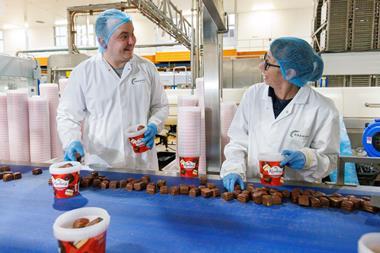
A string of measures designed to kick-start the agriculture, food and drink industry in the wake of coronavirus has been unveiled.
The ‘bounce back’ programme has been developed to support producers, manufacturers and agri-tech companies across the food supply chain. It includes webinars and events to help businesses reach international markets such as Japan, the US, Australia and New Zealand.
The ‘bounce back’ programme has been developed by the Department for International Trade (DIT) and Department for Environment, Food and Rural Affairs (Defra) with insight from the devolved administrations, trade associations and businesses.
Government support on such a scale was extremely welcome at this uncertain time, said Food and Drink Federation chief executive Ian Wright.
“The ‘bounce back’ plan would ensure that specialist support was available to those UK businesses which traded around the world and provided fantastic potential for those companies looking to export,” he added.
“With a footprint in every constituency, food and drink is uniquely placed to drive an exports-led recovery. In the longer term, it is important that government and industry continue to work together to take advantage of export opportunities and address fragmentation in available support across the UK.”
The measures announced include:
- Great DIT Food & Drink Exporting Masterclass: a programme of webinars to be produced in conjunction with trade associations, UK regions, including devolved administrations, and DIT’s international network, and supported by DIT’s export specialists.
- Food & Drink SME E-commerce Accelerator Pilot: designed to leverage DIT’s E-exporting Programme and increase the level of international e-commerce support for small and medium-sized food and drink enterprises (SMEs). This will include one-to-one e-commerce export clinics with e-commerce specialists and regional advisers; webinars and podcasts focused on highlighting the opportunities available to export through e-marketplaces internationally; as well as virtual workshops on internationalising websites for companies selling direct to consumers in various markets around the world.
- Promote 50 Food and Drink Export Champions: to stimulate aspiring exporters, while using International Trade Advisor specialist networks focused on agri-food.
- The first Defra Agri-food Counsellor serving the UAE and wider Gulf Region: the role will focus on supporting the food and drink sector and representing the interests of UK businesses already exporting to the area, as well as those looking to export for the first time. The counsellor will be based in Dubai and will also support food and drink promotion activity at the UK pavilion at World Expo in 2021, identifying opportunities for new markets and further developing existing export relationships.
- Physical and virtual events: including an overseas virtual buyer trial, working directly with US buyers through a virtual delivery programme; and developing a UK ‘Smart Distance Selling Process’, which includes sending food and drink samples to buyers.
- Leveraging Defra’s Food is Great campaign, which will extend into the UAE and the EU later this year, to provide targeted activity in priority export markets, such as the (UKEF’US, China and Japan.
- Virtual Investor Roundtables: chaired by Lord Grimstone, Minister for Investment, with agri-food and drink, and agri-tech companies to inform the development of the UK’s investment strategy, the UK Agri-Tech International Strategy and the launch of Phase 2 of the High Potential Opportunity Programme.
- Boosting UK Export Finance’s (UKEF’s) Exporters’ Edge campaign to identify and respond to the needs of the industry and raise awareness of how UKEF and Trade Finance can help the businesses win export contracts.
“More trade is absolutely critical to helping the UK’s agriculture, food and drink industry recover from the impact of coronavirus,” said export minister Graham Stuart.
“The package of measures will help our world-class producers and manufacturers increase trade with the rest of the world. It will also get the industry ready to capitalise on the opportunities that are being opened up by the series of free trade agreements that my department is negotiating around the world
































No comments yet